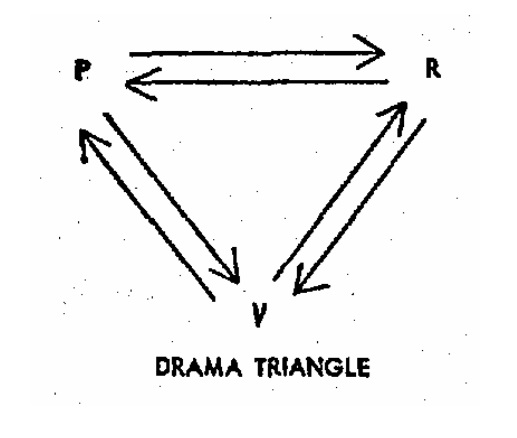Victimhood and the Drama Triangle
To recap: in any group of humans without leaders, people notice what personally disadvantages them and demand that society fix it, leading to a situation where everyone feels like a victim, and therefore, discourse turns away from big problems and focuses on making sure everyone feels okay.
This creates a philosophy of individualism, or me-first at the expense of all else, which manifests through a contrarian outlook. The individual needs the crowd to validate his victimhood, but this makes him hate the crowd for making him dependent on it.
A pathology of this nature grips any society that has entered its death-stage. It takes centuries to play out, but its population changes from being solution-oriented to being victimhood-oriented. This creates an attitude of pursuing symbolic goals instead of real ones; symbolism manipulates the herd but they cannot understand real problems.
That pursuit of the lowest common denominator quickly causes the group to ignore actual problems and pursue symbolic flights of fancy like Utopia or Apocalypse, veering between religion and fatalism, while increasingly feeling a decrease in their belief in their own efficacy.
What we identify here as the talisman-scapegoat dichotomy emerges from that: you are either a virtuous victim or an evil oppressor. This allows people to manipulate others with fears of the evil oppressor and portrayal of themselves as virtuous victims.
As it turns out, this pathology has been portrayed in popular science as the Drama Triangle because it creates a narrative and forces change within it:
Only three roles are necessary in drama analysis to depict the emotional reversals that are drama. These action roles, in contrast with the identity roles referred to above, are the Persecutor, Rescuer, and Victim, or P, R, and V, in the diagram. Drama begins when these roles are established, or are anticipated by the audience. There is no drama unless there is a switch in the roles. This is indicated by a change in the vector direction along the diagram.
In the Pied Piper, the hero begins as Rescuer of the city and Persecutor of the rats, then becomes Victim to the Persecutor mayor’s double-cross (fee withheld), and in revenge switches to the Persecutor of the city’s children. The mayor switches from Victim (of rats), to Rescuer (hiring the Pied Piper), to Persecutor (double-cross), to Victim (his children dead). The children switch from Persecuted Victims (rats) to Rescued Victims, to Victims Persecuted by their Rescuer (increased contrast).
This forms a diagram like this:
Any participant can become any of the other two, and the drama of the story can be driven by these role changes. This means that each role is at risk of becoming one of the two others if the perception of the audience changes. A virtuous victim can easily become an evil oppressor.
For example, recently Israel and Jews went from being virtuous victims of the Holocaust to being seen as evil oppressors of the Palestinians, mainly because the Palestinians as poorer, dumber, and weaker are more fit to be victims in the eyes of the public. When a Victim beats up on someone weaker, the two change roles.
America went from being the Rescuer to a Persecutor because while it did not fully support Israel, it sent money and weapons as usual despite lots of posturing from the White House. Where previously America was the white knight riding in to save the day, now it joins Israel in being an evil persecutor.
Maybe someday humans will realize that this game never goes well. You can use victimhood to get ahead, but then as events change, even if your role has not changed, you will become the Persecutor. Even if you are a Rescuer, at some point you will transition to the other role.
Manipulation through symbols like virtuous victims will win over a crowd, but the crowd has no loyalty. Eventually it turns on everyone because in a situation without leadership, blind fiends of chaos rule, and therefore everything eventually gets destroyed. Symbolism just hastens the process.
Tags: age of symbolism, drama triangle, oppressor, rescuer, victimhood











